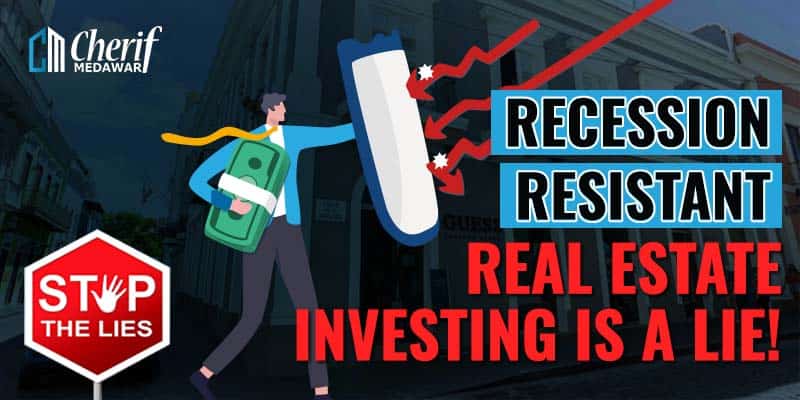Real estate investors have long been searching for a secret to recession-resistant investing. The idea is simple: invest in properties more likely to withstand economic downturns and provide stable returns, regardless of market conditions. Unfortunately, the truth is that recession-resistant real estate investing is a lie.
The Reality of Economic Recessions
Economic recessions can impact all real estate markets, regardless of location or property type. Even the most affluent areas and high-end properties can suffer during an economic downturn. For example, the demand for luxury properties can decline significantly, leading to a drop in property values. Similarly, commercial properties, such as office spaces or retail buildings, can be challenging as businesses reduce expenses and downsize. No market or property type is immune to the effects of a recession.
False Sense of Security Created by Government Intervention
During economic downturns, governments often introduce low interest rates and stimulus packages to boost the economy. These measures can make it easier for investors to obtain financing, and this leads to a temporary increase in demand for real estate. However, this boost is often short-lived, and once the government intervention ends, the market can quickly return to its prerecession state. This can create a false sense of security for real estate investors.
For example, during the 2008 recession, the U.S. government introduced the Troubled Asset Relief Program (TARP) to stabilize the financial sector. This program injected billions of dollars into the economy and temporarily boosted real estate demand. However, once the program ended, the market quickly returned to its prerecession state, and many investors suffered significant losses.
The Fallacy of Historical Data
The idea of recession-resistant real estate investing is often based on historical data, which may not be a reliable predictor of future success. Past performance does not guarantee future success, and market conditions can change quickly. Economic factors, such as interest rates, employment rates, and consumer confidence, can all impact the real estate market. As a result, no investment is entirely safe, and investors should always consider the potential risks before investing in any market or property.
Furthermore, the current economic climate is unlike any other in history. The COVID-19 pandemic has caused unprecedented disruptions to the global economy, and the long-term impact of this crisis is still uncertain. Therefore, traditional market indicators and historical data may not be relevant in the current environment, and investors must be cautious about relying too heavily on these factors.
The Importance of Risk Management
While no investment is entirely recession-resistant, there are strategies investors can use to mitigate risk and increase their chances of success.
Diversification: Investing in a range of properties and markets can spread risk and minimize the impact of any single parcel or market downturn. Additionally, investors should consider emerging markets or alternative investment options, such as real estate crowdfunding or investment trusts (REITs), to reduce their exposure to any single market or property type.
Due Diligence: Another essential aspect of risk management is conducting thorough due diligence before investing. Investors should research the local market, analyze the property’s financials, and consider potential risks or challenges before purchasing. They should also work with experienced real estate professionals, such as brokers or property managers, who can provide valuable insight and advice.
Steps to Invest in Commercial Real Estate Like a PRO
Cherif Medawar copyrighted his FACTS investment system to take away the mystery and unpredictability of commercial real estate.
The FACTS:
- Find the deal
- Analyze and calculate
- Control the deal
- Time for due diligence and financing
- Strategize
While no investment strategy can guarantee success, Cherif’s FACTS system is a valuable resource for investing in real estate. By focusing on the fundamentals and staying disciplined, investors can make informed decisions and increase their chances of success in any market.
Conclusion
In conclusion, the idea of recession-resistant real estate investing is a lie. Economic downturns can impact all real estate markets; no property type is entirely safe. Instead of searching for a magic solution, investors should focus on strategies to help them navigate the ups and downs of the real estate market. By diversifying their portfolio, considering emerging markets, and looking for alternative investment options, investors can reduce risk and increase their chances of success. Real estate investing can still be profitable and viable, but investors must be cautious and realistic about the potential risks involved.
There will be many opportunities in 2023 for people to break into commercial real estate. But there will also be challenges. Know how to FIND, ANALYZE, CONTROL, TIME, and STRUCTURE the deals. See BLUE OCEAN OPPORTUNITIES IN COMMERCIAL REAL ESTATE. Get your free copy.


